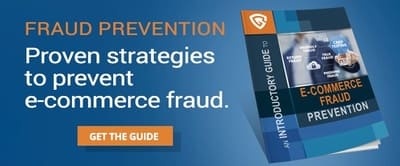How to Reverse PayPal Disputes
Table of Contents
- What Are PayPal Disputes?
- What Are PayPal Claims?
- What Are PayPal Bank Claims?
- What Are Chargebacks?
- What to Do About PayPal Disputes
- Why Fight PayPal Disputes?
- Is a PayPal Chargeback Illegal?
- Do Sellers Ever Win PayPal Disputes?
- What Happens if You Lose a PayPal Dispute?
When we talk about chargebacks, we're usually talking about payments made with credit or debit cards. However, that's far from the only way e-commerce merchants get paid. One of the most common alternative payment methods is PayPal, and just like credit cards, PayPal payments are subject to dispute. In fact, there are a number of different types of payment disputes merchants can face on PayPal. PayPal Disputes can be escalated to claims, and a chargeback on the payment used to fund a PayPal transaction can lead to a bank claim.
Fortunately, merchants aren't left defenseless when a dispute strips away their hard-earned revenue. By carefully following the rules and submitting the right evidence, merchants can reverse PayPal disputes. Let's take a look at the different kinds of payment disputes that can occur on PayPal and how merchants can fight back, reverse disputes, and recover revenue.
What Are PayPal Disputes?
 If the seller ignores the dispute or doesn’t offer the buyer a satisfactory way to resolve things, the buyer has 20 days to escalate the dispute to a claim.
If the seller ignores the dispute or doesn’t offer the buyer a satisfactory way to resolve things, the buyer has 20 days to escalate the dispute to a claim.
The seller is charged an $8 dispute fee each time they receive a dispute, though sellers with a particularly high dispute ratio (over 1.5%) can have that fee doubled).
What Are PayPal Claims?
When a buyer claims that the purchase was fraudulent, PayPal initiates a claim directly rather than starting with a dispute. Therefore, the dispute fee won't apply. Just like any other claim, PayPal will investigate and attempt to determine if the transaction was indeed fraudulent.
What Are PayPal Bank Claims?
When they do so, the funds are taken back out of the seller’s account and the seller is charged a $20 fee. In order to get the funds back, the seller must provide evidence that can be submitted to the bank to prove that the transaction was legitimate. However, this will not reverse the fee.
What Are Chargebacks?
Buyers typically have 120 days to file a chargeback on a credit card purchase from Visa and Mastercard, which includes PayPal transactions funded by a credit card. From a seller's perspective, a chargeback on such a transaction will reach them as a bank claim.
If the seller wants to fight the chargeback, they have to submit compelling evidence proving the validity of the charge. The seller uploads this documentation to the PayPal Resolution Center, and the issuing bank makes the final decision. Once their decision is made, they notify PayPal, which then notifies the seller.
What to Do About PayPal Disputes
If you do business over PayPal, here are five things you can do to minimize disputes and fight them successfully.
-
Respond to buyer emails as promptly as you can. Disputes often arise, and escalate to claims or chargebacks, because of a lack of responsiveness on the seller’s part. Be available to your customers and try your best to resolve any disputes—no matter the reason—before the buyer gets PayPal or their bank involved.
-
 Enroll in the PayPal Seller Protection Program. There are certain eligibility requirements for this program, but if you qualify, it offers a good deal of protection against many transaction issues.
Enroll in the PayPal Seller Protection Program. There are certain eligibility requirements for this program, but if you qualify, it offers a good deal of protection against many transaction issues. -
If PayPal requests documentary evidence from you, be sure to provide it on time. When a buyer initiates a chargeback, the seller only has 10 days to respond. Upload all relevant evidence to the PayPal Resolution Center before the deadline or PayPal will not be able to factor it into its decisions.
-
Contact the buyer directly and try to work things out with them. Buyers can cancel chargebacks and PayPal disputes, and if they do so, PayPal gets its money back and will usually return it to the seller within 90 business days (a holding period to ensure that no further disputes get filed).
-
Take advantage of PayPal’s community activities. PayPal offers programs that can help sellers learn how to run a successful online store. Once a week, there are online chats where PayPal program experts answer questions. The PayPal community can also be a great resource for ideas, support, and valuable information
Why Fight PayPal Disputes?
Merchants who show themselves to be susceptible to chargeback fraud will often find themselves victimized over and over again until they either take steps to stop it from happening—or go out of business.
With diligent record-keeping, attentive customer service, and a knowledgeable approach to navigating PayPal, merchants can avoid many of the pitfalls that lead to claims, chargebacks, and lost revenue.
Also note that PayPal is primarily used for Card-Not-Present (CNP) transactions online. CNP transactions are the most common types of transactions for potential fraud, whether true fraud or friendly fraud.
If you are facing PayPal chargebacks, there is a chance that the cardholder is attempting to get some goods or services for free, and using the chargeback process to do it.
Businesses that process e-commerce and other card-not-present transactions—including the over 17 million who use PayPal for payments—are quickly learning about the risks and realities of chargebacks.
FAQ
Is a PayPal Chargeback Illegal?
Do Sellers Ever Win PayPal Disputes?
What Happens if You Lose a PayPal Dispute?
Thanks for following the Chargeback Gurus blog. Feel free to submit topic suggestions, questions, or requests for advice to: win@chargebackgurus.com


